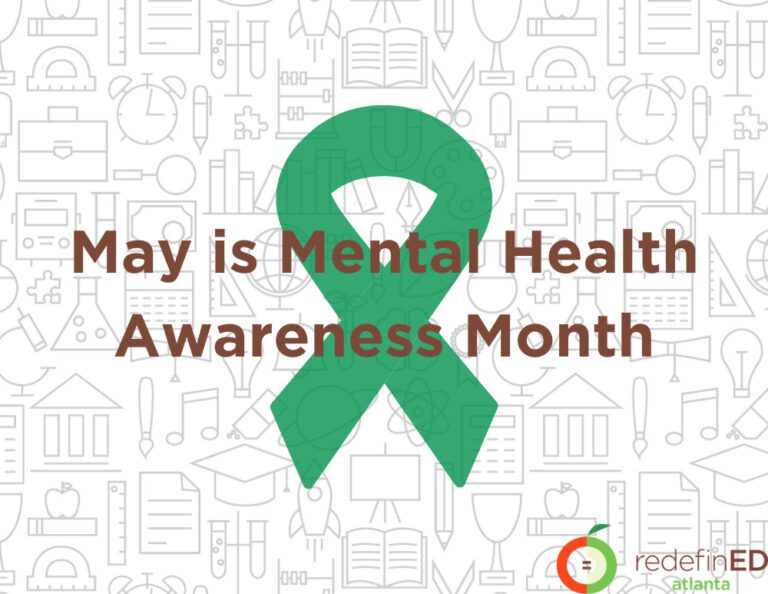
May is Mental Health Awareness Month. As public schools are still navigating through a pandemic, we wanted to take a moment to share how the pressures of teaching during these difficult times can impact school talent’s mental health. We sat down with Rachelle Clay, a former teacher, for a candid Q&A about how she managed the challenges of teaching during a global pandemic.
redefinED atlanta: Teachers have been the unsung heroes for many years. What was your teaching experience like prior to the pandemic?
Clay: Teaching is already a stressful profession and became more stressful during the pandemic. Prior to the pandemic, my worries were, “am I doing enough; am I providing enough differentiation, remediation and extensions in my lessons to keep my students engaged and growing?”
In addition to making sure my students were academically stimulated, I wanted to make sure they were socially and emotionally well. By March of 2020, the worst had yet to come. Enter the pandemic, and the uncertainty of what teaching and education would look like. What was supposed to be a 2-week virtual learning experience, stretched to a year and a half.
redefinED atlanta: What was it like being in the classroom when school districts had to make critical decisions and shift to virtual learning?
Clay: Educators scrambled to shift to virtual learning, trying to make sense of what it meant, and how to deliver quality instruction via Zoom, Microsoft Teams or Google Meet. An extremely daunting task, in addition to all of the other stressors of teaching.
redefinED atlanta: What were some of the stressors that kept you up at night when you were teaching during the pandemic?
Clay: During the pandemic my stress level increased significantly. There were unrealistic expectations from school administration to operate under “business as usual,” when there were greater concerns such as the educational inequities that some families would endure as a result of not having access to the technology or the internet service that would help in making their students successful in a virtual educational setting.
Then there was the compounded stress I placed on myself to try and maintain the same level of rigor I provided my students in person. Coupled with the fact that there was no escape from work, as it was now in my home, I felt as if I was perpetually working. In order to regain my peace and some resemblance of normalcy, I had to learn to extend grace to myself, while being intentional about setting boundaries and practicing self-care.
redefinED atlanta: What were some of the ways you managed your stresses while teaching virtually?
Clay: During this time, I learned to be okay with not being okay and to accept things that were out of my control. In doing so, I learned to surrender to my feelings, to sit in them and to try to best understand the root cause of the feeling.
I began to meditate, which helped me to identify triggers for my stress. I became intentional about taking breaks, closing my computer and walking away. I learned to ask for and accept help, and most importantly I worked on being kind, gentle, compassionate and loving to myself. I spoke words of affirmation to build myself up, instead of breaking myself down, because I am my own worst critic.
redefinED atlanta: Even through all the challenges, what were some of your personal successes?
Clay: Despite the difficulties of the pandemic, I feel as though I met the challenges presented and grew in the process. I developed a self-care routine of mindfulness and introspection that I may not have otherwise done, had it not been for the stress associated with the pandemic.
Amid the growth, I chose not to return to the classroom at the start of the most recent school year. I am not sure if I will return to the classroom, but I do see myself working with students in some capacity, in the future, as it is my passion and my gift.
redefinED atlanta: As you look back at your teaching experience, what’s a major takeaway you want readers to remember when thinking about teachers and other school talent?
Clay: As I reflect on my time in the classroom, pre and post-pandemic, it is my hope that society will become more empathetic and compassionate toward educators. Education is often a thankless job where the professionals are highly criticized, while being undervalued and underappreciated. Moving forward, I would implore society to try and be a little more understanding of educators, to show a little kindness and to extend a little more grace, because grace is something that we all can be afforded.
redefinED atlanta understands that great schools have great teachers. And while teacher burnout is becoming more common, here are some resources educators can use to help manage stresses in and outside of the classroom:
To read similar stories or other announcements, please visit our newsroom!
Join our growing collective of parents, educators, community leaders, and philanthropists invested in Atlanta public school education. Together, we will transform this city into a place where every student in every community has access to a great K-12 public education.

Copyright © 2025. All rights reserved.
Privacy Policy | Terms of Use